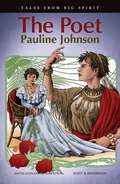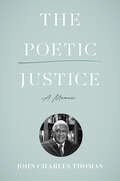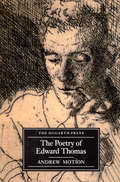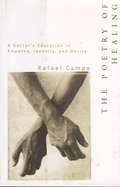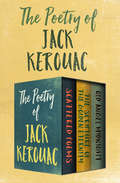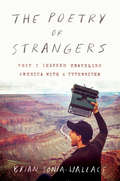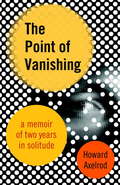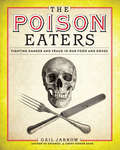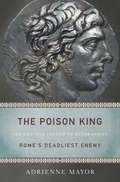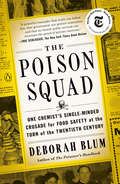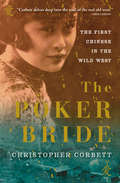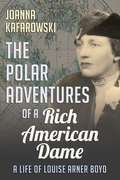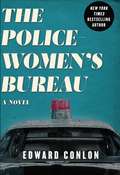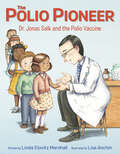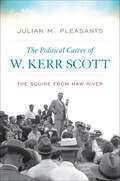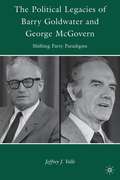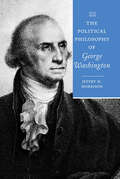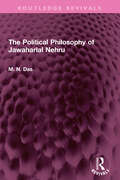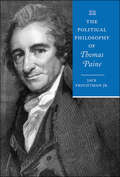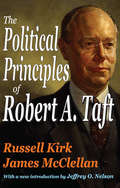- Table View
- List View
The Poet: Pauline Johnson (Tales from Big Spirit #6)
by David A. RobertsonAlthough Kathy loves poetry, she is far too shy to recite it in front of her class. But the story of Pauline Johnson, renowned as the "Mohawk Princess," inspires Kathy to overcome her stage fright. Pauline, from the Grand River Reserve in Ontario, crisscrossed the country, reciting her poems to far-flung communities, making her among the most beloved literary figure of the Edwardian era.The Poet is one book in the Tales from Big Spirit series. Tales from Big Spirit is a unique seven-book graphic novel series that delves into the stories of seven great Indigenous heroes from Canadian history—some already well known and others who deserve to be. Designed to correspond to grades 4–6 social studies curriculums across Canada, these full colour graphic novels could be used in literature circles, novel studies, and book clubs to facilitate discussion of social studies topics. These books will help students make historical connections while promoting important literacy skills.
The Poet: Pauline Johnson (Tales from Big Spirit #6)
by David A. RobertsonAlthough Kathy loves poetry, she is far too shy to recite it in front of her class. But the story of Pauline Johnson, renowned as the "Mohawk Princess," inspires Kathy to overcome her stage fright. Pauline, from the Grand River Reserve in Ontario, crisscrossed the country, reciting her poems to far-flung communities, making her among the most beloved literary figure of the Edwardian era.The Poet is one book in the Tales from Big Spirit series. Tales from Big Spirit is a unique seven-book graphic novel series that delves into the stories of seven great Indigenous heroes from Canadian history—some already well known and others who deserve to be. Designed to correspond to grades 4–6 social studies curriculums across Canada, these full colour graphic novels could be used in literature circles, novel studies, and book clubs to facilitate discussion of social studies topics. These books will help students make historical connections while promoting important literacy skills.
The Poetic Justice: A Memoir
by John Charles ThomasThis inspiring memoir begins in 1983, on the day John Charles Thomas was sworn in as the first Black—and, at thirty-two years of age, the youngest—justice of the Supreme Court of Virginia in the commonwealth’s history. This high point was preceded, however, by a life that began in a home broken by poverty, alcoholism, and violence, and the segregated schools and neighborhoods of postwar Norfolk. How this triumph against such tremendous odds came about is no feel-good story or fable but a real-life journey full of poignant stories.This eloquent memoir is the work of a man who cares deeply about language. In addition to being a social justice pioneer, Judge Thomas is an accomplished poet who has recited his poetry to a Carnegie Hall audience and who here reflects on his twin loves of poetry and the law. As he chronicles his trajectory from the "wrong side of the tracks" in Norfolk to the supreme court bench in Richmond, he takes us from his difficult beginnings to a professional life as a Virginia lawyer, recounts his international travels, and shares his encounters with world leaders such as Chuck Robb and Mikhail Gorbachev. Thomas’s memoir highlights these lofty meetings but also relates with candor the challenges he encountered as he battled the systemic racism that suffuses U.S. society to this day.
The Poetry Of Edward Thomas
by Andrew MotionWhen Edward Thomas died at Arras in 1917 few people thought of him as a poet. Yet in the two years before his death, after a lifetime writing prose, Thomas wrote some of the most enduring poems of his day: poems of war, nature, friendship, despair and exultation. Andrew Motion's pioneering study of Thomas' life and achievement is scholarly yet utterly absorbing, combining an account of his struggles as a writer with perceptive readings of individual poems.Andrew Motion's books include a biography, The Lamberts, George, Constant and Kil, and several prize-winning collections of poetry, the most recent of which is Love in a Life. He is currently writing the authorized biography of Philip Larkin.
The Poetry of Healing: A Doctor's Education in Empathy, Identity, and Desire
by Rafael CampoBack Cover: The healing powers of speech, of touch, of empathy and the erotic, of love itself--these are some of the themes of Rafael Campo's deeply humanistic work as he writes not just of his attempts to heal, but of how his patients healed him. From Campo's arresting first chapter, one is in the hands of the writer who bridges the clinical distance of medicine to face the pain of mortality, the brokenness of society, and the unique and vulnerable beauty of human beings. His work, the Los Angeles Times said, is "reminiscent of Chekhov... [in] the way language comes up out of the body."
The Poetry of Jack Kerouac: Scattered Poems, The Scripture of the Golden Eternity, and Old Angel Midnight
by Jack KerouacFrom the iconic New York Times–bestselling author of On the Road: Three revolutionary collections of poetry in one volume. Rebelling against the dry rules and literary pretentiousness he perceived in early twentieth-century poetry, Jack Kerouac pioneered a poetic style informed by oral tradition and driven by concrete language with neither embellishment nor abstraction. In these three groundbreaking collections, the legendary Beat writer offers a spontaneous, uncensored perspective on everything from religion to the structure of language itself. Scattered Poems: Bringing together selections from literary journals and his private notebooks, Scattered Poems exemplifies Kerouac&’s innovative approach to language. Populated by hitchhikers, Chinese grocers, Buddhist saints, and cultural figures from Rimbaud to Harpo Marx, the poems evoke the primal and the sublime, the everyday and the metaphysical. The Scripture of the Golden Eternity: During an unexplained fainting spell, Kerouac experienced a flash of enlightenment. A student of Buddhist philosophy, he recognized the experience as &“satori,&” a moment of life-changing epiphany. The knowledge he gained in that instant is expressed in this volume of sixty-six prose poems with language that is both precise and cryptic, mystical and plain. His vision proclaims, &“There are not two of us here, reader and writer, but one golden eternity.&” Old Angel Midnight: A spontaneous writing project in the form of an extended prose poem, this sonorous and spiritually playful book is one of Kerouac&’s most boldly experimental works. Collected from five notebooks dating from 1956 to 1959—a time in which Kerouac was immersed in Buddhist theory—Old Angel Midnight captures the rhythms of the universe and secrets of the subconscious with stunning linguistic dexterity.
The Poetry of Strangers: What I Learned Traveling America with a Typewriter
by Brian Sonia-WallaceIt might surprise you who’s a fan of poetry — when it meets them where they are.Before he became an award-winning writer and poet, Brian Sonia-Wallace set up a typewriter on the street with a sign that said “Poetry Store” and discovered something surprising: all over America, people want poems. An amateur busker at first, Brian asked countless strangers, “What do you need a poem about?” To his surprise, passersby opened up to share their deepest yearnings, loves, and heartbreaks. Hundreds of them. Then thousands. Around the nation, Brian’s poetry crusade drew countless converts from all walks of life.In The Poetry of Strangers, Brian tells the story of his cross-country journey in a series of heartfelt and insightful essays. From Minnesota to Tennessee, California to North Dakota, Brian discovered that people aren’t so afraid of poetry when it’s telling their stories. In “dying” towns flourish vibrant artistic spirits and fascinating American characters who often pass under the radar, from the Mall of America’s mall walkers to retirees on Amtrak to self-proclaimed witches in Salem. In a time of unprecedented loneliness and isolation, Brian’s journey shows how art can be a vital bridge to community in surprising places. Conventional wisdom says Americans don’t want to talk to each other, but according to this poet-for-hire, everyone is just dying to be heard.Thought-provoking, moving, and eye-opening, The Poetry of Strangers is an unforgettable portrait of America told through the hidden longings of one person at a time, by one of our most important voices today. The fault lines and conflicts which divide us fall away when we remember to look, in every stranger, for poetry.
The Point of Vanishing
by Howard AxelrodInto the Wild meets Portrait of the Artist as a Young Man--a lyrical memoir of a life changed in an instant and of the perilous beauty of searching for identity in solitude On a clear May afternoon at the end of his junior year at Harvard, Howard Axelrod played a pick-up game of basketball. In a skirmish for a loose ball, a boy's finger hooked behind Axelrod's eyeball and left him permanently blinded in his right eye. A week later, he returned to the same dorm room, but to a different world. A world where nothing looked solid, where the distance between how people saw him and how he saw had widened into a gulf. Desperate for a sense of orientation he could trust, he retreated to a jerry-rigged house in the Vermont woods, where he lived without a computer or television, and largely without human contact, for two years. He needed to find, away from society's pressures and rush, a sense of meaning that couldn't be changed in an instant.From the Trade Paperback edition.ions of perception, time, identity, and meaning.From the Trade Paperback edition.
The Poison Eaters: Fighting Danger And Fraud In Our Food And Drugs
by Gail JarrowFormaldehyde, borax, salicylic acid. Today, these chemicals are used in embalming fluids, cleaning supplies, and acne medications. But in 1900, they were routinely added to food that Americans ate from cans and jars.In 1900, products often weren't safe because unregulated, unethical companies added these and other chemicals to trick consumers into buying spoiled food or harmful medicines. Chemist Harvey Washington Wiley recognized these dangers and began a relentless thirty-year campaign to ensure that consumers could purchase safe food and drugs, eventually leading to the creation of the U.S. Food and Drug Administration, or FDA, a US governmental organization that now has a key role in addressing the COVID-19/Coronavirus pandemic gripping the world today. Acclaimed nonfiction and Sibert Honor winning author Gail Jarrow uncovers this intriguing history in her trademark style that makes the past enthrallingly relevant for today's young readers.Six starred reviews -- ★Booklist ★BCCB ★Kirkus Reviews ★Publishers Weekly ★School Library Connection ★Shelf AwarenessAn ALSC Notable Children's Book * A Washington Post Best Children's Book * NCTE Orbis Pictus Honor Book * A BCCB Blue Ribbon * A Kirkus Reviews Best Children's Book * A NSTA Outstanding Science Trade Book for Students K-12 * A Chicago Public Library Best Children's Book★ "Revolting and riveting in turns, Jarrow's masterfully crafted narrative will fundamentally alter how readers view their food.Though laced with toxins, this is anything but toxic." -- Kirkus Reviews, starred review
The Poison King: The Life and Legend of Mithradates, Rome's Deadliest Enemy
by Adrienne Mayor"Meticulous in its research, exciting in its narration, ambitious in its conception, "The Poison King" re-creates an era when much of the Mediterranean world rebelled against Rome. At the center of it all is the fascinating and frightening king who rallied the resistance: Mithradates. Mayor has written a terrific book. "--Barry Strauss, author of "The Spartacus War". "Adrienne Mayor's "The Poison King" is an intriguing and highly readable new biography of one of the most controversial figures of antiquity, Mithradates--ruthless Hellenistic king, genocidaire, terrorist, alchemist, implacable enemy of Rome. It is an important contribution to our understanding of the desperate measures some rulers were prepared to take to resist Rome's iron-fisted pursuit of empire."--R. Bruce Hitchner, Tufts University.
The Poison King: The Life and Legend of Mithradates, Rome's Deadliest Enemy
by Adrienne MayorA compelling biography of the legendary king, rebel, and poisoner who defied the Roman EmpireMachiavelli praised his military genius. European royalty sought out his secret elixir against poison. His life inspired Mozart's first opera, while for centuries poets and playwrights recited bloody, romantic tales of his victories, defeats, intrigues, concubines, and mysterious death. But until now no modern historian has recounted the full story of Mithradates, the ruthless king and visionary rebel who challenged the power of Rome in the first century BC. In this richly illustrated book—the first biography of Mithradates in fifty years—Adrienne Mayor combines a storyteller's gifts with the most recent archaeological and scientific discoveries to tell the tale of Mithradates as it has never been told before.The Poison King describes a life brimming with spectacle and excitement. Claiming Alexander the Great and Darius of Persia as ancestors, Mithradates inherited a wealthy Black Sea kingdom at age fourteen after his mother poisoned his father. He fled into exile and returned in triumph to become a ruler of superb intelligence and fierce ambition. Hailed as a savior by his followers and feared as a second Hannibal by his enemies, he envisioned a grand Eastern empire to rival Rome. After massacring eighty thousand Roman citizens in 88 BC, he seized Greece and modern-day Turkey. Fighting some of the most spectacular battles in ancient history, he dragged Rome into a long round of wars and threatened to invade Italy itself. His uncanny ability to elude capture and surge back after devastating losses unnerved the Romans, while his mastery of poisons allowed him to foil assassination attempts and eliminate rivals.The Poison King is a gripping account of one of Rome's most relentless but least understood foes.Some images inside the book are unavailable due to digital copyright restrictions.
The Poison Squad: One Chemist's Single-Minded Crusade for Food Safety at the Turn of the Twentieth Century
by Deborah BlumFrom Pulitzer Prize winner and New York Times-bestselling author Deborah Blum, the dramatic true story of how food was made safe in the United States and the heroes, led by the inimitable Dr. Harvey Washington Wiley, who fought for change <p><p> By the end of nineteenth century, food was dangerous. Lethal, even. "Milk" might contain formaldehyde, most often used to embalm corpses. Decaying meat was preserved with both salicylic acid, a pharmaceutical chemical, and borax, a compound first identified as a cleaning product. This was not by accident; food manufacturers had rushed to embrace the rise of industrial chemistry, and were knowingly selling harmful products. <p> Unchecked by government regulation, basic safety, or even labelling requirements, they put profit before the health of their customers. By some estimates, in New York City alone, thousands of children were killed by "embalmed milk" every year. Citizens--activists, journalists, scientists, and women's groups--began agitating for change. But even as protective measures were enacted in Europe, American corporations blocked even modest regulations. <p> Then, in 1883, Dr. Harvey Washington Wiley, a chemistry professor from Purdue University, was named chief chemist of the agriculture department, and the agency began methodically investigating food and drink fraud, even conducting shocking human tests on groups of young men who came to be known as, "The Poison Squad." Over the next thirty years, a titanic struggle took place, with the courageous and fascinating Dr. Wiley campaigning indefatigably for food safety and consumer protection. <p> Together with a gallant cast, including the muckraking reporter Upton Sinclair, whose fiction revealed the horrific truth about the Chicago stockyards; Fannie Farmer, then the most famous cookbook author in the country; and Henry J. Heinz, one of the few food producers who actively advocated for pure food, Dr. Wiley changed history. When the landmark 1906 Food and Drug Act was finally passed, it was known across the land, as "Dr. Wiley's Law." <p> Blum brings to life this timeless and hugely satisfying "David and Goliath" tale with righteous verve and style, driving home the moral imperative of confronting corporate greed and government corruption with a bracing clarity, which speaks resoundingly to the enormous social and political challenges we face today.
The Poker Bride: The First Chinese in the Wild West
by Christopher CorbettThis true story of a concubine and the Gold Rush years &“delves deep into the soul of the real old west&” (Erik Larson). &“Once the discovery of gold at Sutter&’s Mill launched our &‘national madness,&’ the population of California exploded. Tens of thousands of Chinese, lured by tales of a &‘golden mountain,&’ took passage across the Pacific. Among this massive influx were many young concubines who were expected to serve in the brothels sprouting up near the goldfields. One of them adopted the name of Polly Bemis, after an Idaho saloonkeeper, Charlie Bemis, won her in a poker game and married her. For decades the couple lived on an isolated, self-sufficient farm near the Salmon River in central Idaho. After her husband&’s death, Polly came down to a nearby town and gradually spoke of her experiences. Journalist Christopher Corbett movingly recounts Polly&’s story, integrating Polly&’s personal history into the broader picture of the history of the mass immigration of Chinese. As both a personal and social history, this is an admirable book.&” —Booklist &“A gorgeously written and brilliantly researched saga of America during the mad flush of its biggest Gold Rush. Christopher Corbett&’s genius is to anchor his larger story of Chinese immigration around a poor concubine named Polly. A tremendous achievement.&” —Douglas Brinkley &“Uses Bemis&’s story as a platform for a larger discussion about the hardships of the Chinese experience in the American West.&” —The Washington Post
The Polar Adventures of a Rich American Dame
by Joanna KafarowskiThe first comprehensive biography of Louise Arner Boyd — the intrepid American socialite who reinvented herself as the leading female polar explorer of the twentieth century. <P><P> Born in the late 1880s to a gritty mining magnate who made his millions in the California gold rush and a well-bred mother descended from one of New York’s distinguished families, society beauty Louise Arner Boyd was raised during a glittering era. <P><P> After inheriting a staggering family fortune, she began leading a double life. She fell under the spell of the north in the late 1920s after a sailing excursion to the Arctic Ocean. Over the next three decades, she achieved international notoriety as a rugged and audacious polar explorer while maintaining her flamboyant lifestyle as a leading society woman. Yet despite organizing, financing, and directing seven daring Arctic expeditions between 1926 and 1955, she is virtually unknown today.
The Polar Bear Scientists (Scientists In The Field)
by Peter Lourie Susan Ramer"In the world there are probably fewer than 30 people who spend all or most of their effort working with polar bears. A veteran polar bear biologist, and the man in charge of Alaskan polar bear research for the past thirty years, Dr. Steven Amstrup has worked full time on polar bears since he joined the Polar Bear Project in 1980. The Polar Bear Project conducts ongoing research on polar bear populations and habitats in the Southern Beaufort Sea in Barrow, Alaska. Now under the leadership of George Durner, the Project has collected four decades of detailed, valuable data about how polar bears are responding to sea ice changes in the Arctic. This information has helped raised awareness about polar bears and their plight, and the same data may one day help scientists make new decisions for polar bear survival. Amstrup and Durner now spend most of their time 725 miles south of Barrow, Alaska at the University of Alaska, Anchorage campus, conducting research and drawing conclusions based on the discoveries that their team makes. Those scientists include polar bear biologists Kristin Simac and Mike Lockhart, based at times out of the abandoned Navy Arctic Research Laboratory in Barrow. Every spring scientists like Kristin and Mike go out for six to eight weeks to capture bears on the Southern Beaufort Sea. By capture one means "tranquilize, take samples and measurements, tag, and release" -- The Polar Bear Scientists begins on the first day of capture season and follows Kristin, Mike, and their helicopter mechanic as they fly through the skies over Barrow, looking for polar bears, and finding more water and less ice than they've seen in the past. The process of capturing polar bears is an exciting and challenging one. The polar bears have to be properly tranquilized in a safe area -- so just because the team spots a polar bear, doesn't mean they automatically try to capture it. Tranquilizing a bear too close to water or thin ice might mean the polar bear could stumble in and drown. It's also a challenge to tranq a mom bear and her babies, but when the opportunity presents itself, the team does its best to get the job done. Once they are on the ground with a captured bear, the research begins. All sorts of information and measurements are taken, blood is drawn, tags are affixed. What does it all mean? Are the polar bears getting smaller and moving further to find food every year? Is there more water and less ice than there was before? What can be done?"--
The Policewomen's Bureau: A Novel
by Edward ConlonA page-turning novel about the inner workings of the NYPD, based on the true story of a young officer's decades-long fight for respect in the male-dominated world. The Bronx, 1958. The Policewomen's Bureau isn’t respected within the Department, even when it handles cases the men can’t solve. Marie Carrara is a young police matron who wants to move beyond the grim routine of guarding female prisoners to become one of the few female detectives in the NYPD. Though she is a shy and naive, from a sheltered, immigrant background, Marie dives into the strange and terrifying world of big-city undercover work without hesitation, using her genuine innocence to deceive degenerates and drug dealers into thinking that she’s an easy target. As she begins to create tougher undercover characters, she discovers that they might be able to inspire her in her off-duty life as well. Despite the violence of her job, the sexism she faces daily, and a rocky-at-best marriage waiting for her at home, Marie is determined to make a name for herself within the NYPD and be the role model her young daughter deserves. With the support of Marie Cirile, the real-life inspiration for Marie Carrara, Edward Conlon adapts the true events of her memoir into a thrilling drama, a book only a best-selling author and decorated Bronx detective could have written.
The Polio Pioneer: Dr. Jonas Salk and the Polio Vaccine
by Linda Elovitz MarshallA SYDNEY TAYLOR NOTABLE BOOK • Learn about the importance of vaccines and the scientific process through the fascinating life of world-renowned scientist Jonas Salk, whose pioneering discoveries changed the world forever.Dr. Jonas Salk is one of the most celebrated doctors and medical researchers of the 20th century. The child of immigrants who never learned to speak English, Jonas was struck by the devastation he saw when the soldiers returned from battle after WWII. Determined to help, he worked to become a doctor and eventually joined the team that created the influenza vaccine. But Jonas wanted to do more. As polio ravaged the United States--even the president was not immune!--Jonas decided to lead the fight against this terrible disease. In 1952, Dr. Jonas Salk invented the polio vaccine, which nearly eliminated polio from this country. For the rest of his life, Dr. Salk continued to do groundbreaking medical research at the Salk Institute, leaving behind a legacy that continues to make the world a better place every day.This compelling picture book biography sheds light on Dr. Salk's groundbreaking journey and the importance of vaccination.
The Political Career of Floyd B. Olson
by George H. MayerPolitical biography of a beloved governor of Minnesota during the 1930s.
The Political Career of W. Kerr Scott: The Squire from Haw River (New Directions In Southern History Ser.)
by Julian M. Pleasants“This biography will find its place among a growing literature on post-war Southern politics.” —Charles Holden, author of The New Southern University: Academic Freedom and Liberalism at UNCWhen W. Kerr Scott (1896–1958) began his campaign for the North Carolina gubernatorial seat in 1948, his opponents derided his candidacy as a farce. However, the plainspoken dairy farmer quickly gathered loyal supporters and mobilized a grassroots attack on the entrenched interests that had long controlled the state government, winning the race in a historic upset.In this meticulously researched book, Julian M. Pleasants traces Scott’s productive and controversial political career, from his years as North Carolina commissioner of agriculture, through his governorship (1949–1953), to his brief tenure as a U.S. senator (1954–1958). Scott was elected at a time when southern liberals were on the rise in post-World War II America. McCarthyism and civil rights agitation soon overwhelmed progressivism, but the trend lasted long enough for the straight-talking “Squire from Haw River” to enact major reforms and establish a reputation as one of the more interesting and influential southern politicians of the twentieth century. This long-overdue look at his political career illuminates the spirit that transformed an introspective, segregated society dependent on tobacco and textiles into a vibrant, diversified economy at the center of the industrial, banking, and information revolution in the South.“Pleasants writes with clarity and authority.” —Jeffrey J. Crow, Deputy Secretary, North Carolina Department of Cultural Resources (ret.)
The Political Legacies of Barry Goldwater and George McGovern
by Jeffrey J. VolleThis book is about redemption for people on the right and left of the political spectrum who can be proud of two politicians, Senator's Barry Goldwater and George McGovern, who demonstrated that defeat can be accepted with decency and honor.
The Political Philosophy of George Washington (The Political Philosophy of the American Founders)
by Jeffry H. Morrison&“A delight . . . rewarding insight into Washington and his times . . . and an illuminating section on the religious outlook of this American founder.&” —Journal of American History George Washington is revered as the father of his country, a clever and skilled general, and a man of restrained principle—but not as a political thinker. This short introduction to Washington&’s political philosophy reveals him as a thoughtful public intellectual who was well equipped to lead the young United States. Though Washington left little explicit writing on political philosophy, Jeffry Morrison examines his key writings, actions, education, and political and professional lives. He finds that Washington held closely to a trinity of foundational principles—classical republicanism, British liberalism, and Protestant Christianity—with greater fidelity than many of the other founding fathers. In unearthing Washington&’s ideological growth, Morrison reveals the intellectual heritage of his political thought and shows how these beliefs motivated him to action. This insightful, concise story makes clearer the complexities of the revolutionary era and shows how the first president&’s political ideas shaped governmental institutions and instantiated the nation&’s foundational principles. &“Those who accept the &‘dumb general&’ caricature should be chastened by Morrison&’s elegant and concise sampling of Washington&’s writings . . . This work deserves to be studied and debated by political scientists, historians, and public intellectuals concerned with America&’s fundamental political principles and those of liberal democracy.&” —Review of Politics
The Political Philosophy of Jawaharlal Nehru (Routledge Revivals)
by M.N. DasFirst published in 1961, The Political Philosophy of Jawaharlal Nehru is an attempt to coordinate Jawaharlal Nehru’s ideas which, in essence, reflect his political philosophy. Nehru distinguished himself as a philosopher-politician, thinking somewhat as a philosopher while working as a politician, steering his political ideas between idealism and realism. In an eventful life, his had been the many-sided role of a revolutionary and a nationalist, a democrat and a socialist, an internationalist and a pacifist, a head of the government and, above all, a lone individual and thinker. Nehru preserved his individuality through all external influences, including those of Gandhi and Marx, and it is this which remains the keynote of his thought. It has been the aim of the author to present in an objective way the ideas of the man in the light of his own words as available from a wide range of material. This book will be of interest to students of history, political science, and philosophy.
The Political Philosophy of Thomas Paine (The Political Philosophy of the American Founders)
by Jack Fruchtman Jr.A study of the work, philosophy, and life of the influential eighteenth-century American writer.This concise, thoughtful introduction to the work of Thomas Paine, author of Common Sense and Rights of Man, explores the impact of one of the most influential minds of the American and French Revolutions and the sources from which his thinking evolved.In Jack Fruchtman Jr.’s helpful interpretation, Paine built his argument for radical revolution in 1776 on a study of nature and Providence and a belief in natural rights. Men and women owed it to themselves to break the chains of rank, hierarchy, and even organized religion in order to live freely, embracing the possibilities of invention, progress, and equality that lay ahead. In 1793, at the height of the French Revolution and its secularizing fury, Paine reminded readers that it was nature's God who created natural rights. The rights of man thus held out both the great potential of freedom and the requirement that human beings be responsible for those who were the least fortunate in society. On balance we may think of Paine as a secular preacher for the rule of reason.“A compelling portrait of Thomas Paine as a serious, complex, and often surprising writer. . . . This is a very useful volume for new students of U.S. political thought, as well as for scholars seeking a quick but illuminating overview of Paine’s writings and philosophy.” —Choice“A great way for the newcomer to appreciate the range, diversity, and raw power and brilliance of Paine's ideas.” —Claremont Review of Books“Fruchtman’s concise analysis is tightly focused. . . . A coherent vision of Paine’s work, encompassing his many contradictions.” —Times Literary Supplement (UK)
The Political Principles of Robert A. Taft
by Russell KirkRobert A. Taft has been neglected by some historians and political theorists and vilified by others. Vigorously and impartially written, this book analyzes the ideas and influence of a great U.S. senator of the twentieth century. Here readers will find a close and lively examination of Taft's convictions on freedom, justice, labor policy, social reform, foreign affairs, and the responsibilities of political parties.Respected for his intelligence and integrity, Robert Taft was considered the most remarkable public man of a turbulent political era. He was strong and candid, yet was repeatedly denied executive power. Despite this, he will undoubtedly be long remembered.Drawing on many contemporary sources, including the Taft Papers in the Library of Congress, Kirk and Mc- Clellan set Taft in historical perspective. Taft's enduring significance to a normative theory of politics is made clear in this careful study, which includes extensive quotations from his outstanding speeches and writings. Available in paperback for the first time, this edition includes a new introduction by Jeffrey Nelson, who has been closely associated with Russell Kirk.
The Political Psychology of Israeli Prime Ministers
by Yael S. AronoffThis book examines leaders of the seemingly intractable conflict between Israel and its Palestinian neighbors. It takes as an intellectual target of opportunity six Israeli prime ministers, asking why some of them have persisted in some hard-line positions but others have opted to become peacemakers. This book argues that some leaders do change, and above all it explains why and how such changes come about. This book goes beyond arguing simply that "leaders matter" by analyzing how their particular belief systems and personalities can ultimately make a difference to their country's foreign policy, especially toward a long-standing enemy. Although no hard-liner can stand completely still in the face of important changes, only those with ideologies that have specific components that act as obstacles to change and who have an orientation toward the past may need to be replaced for dramatic policy changes to take place.
